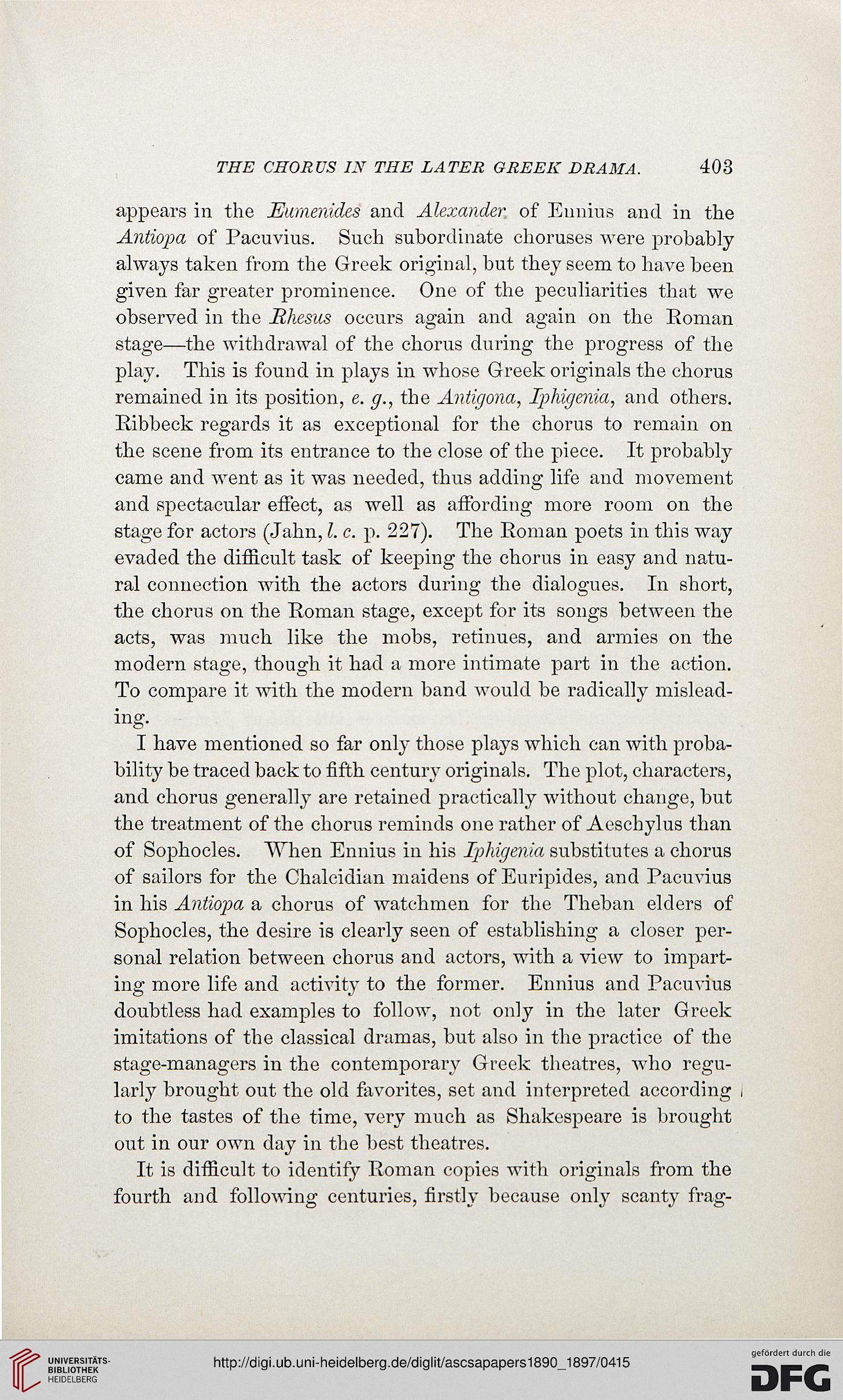THE CHORUS IN THE LATER GREEK DRAMA.
403
appears in the Eumenides and Alexander of Eunius and in the
Antiopa of Pacuvius. Such subordinate choruses were probably
always taken from the Greek original, but they seem to have been
given far greater prominence. One of the peculiarities that we
observed in the Rhesus occurs again and again on the Roman
stage—the withdrawal of the chorus during the progress of the
play. This is found in plays in whose Greek originals the chorus
remained in its position, e. g., the Antigona, Iphigenia, and others.
Ribbeck regards it as exceptional for the chorus to remain on
the scene from its entrance to the close of the piece. It probably
came and went as it was needed, thus adding life and movement
and spectacular effect, as well as affording more room on the
stage for actors (Jahn, I. c. p. 227). The Roman poets in this way
evaded the difficult task of keeping the chorus in easy and natu-
ral connection with the actors during the dialogues. In short,
the chorus on the Roman stage, except for its songs between the
acts, was much like the mobs, retinues, and armies on the
modern stage, though it had a more intimate part in the action.
To compare it with the modern band would be radically mislead-
ing.
I have mentioned so far only those plays which can with proba-
bility be traced back to fifth century originals. The plot, characters,
and chorus generally are retained practically without change, but
the treatment of the chorus reminds one rather of Aeschylus than
of Sophocles. When Ennius in his Iphigenia substitutes a chorus
of sailors for the Chalcidian maidens of Euripides, and Pacuvius
in his Antiopa a chorus of watchmen for the Theban elders of
Sophocles, the desire is clearly seen of establishing a closer per-
sonal relation between chorus and actors, with a view to impart-
ing more life and activity to the former. Ennius and Pacuvius
doubtless had examples to follow, not only in the later Greek
imitations of the classical dramas, but also in the practice of the
stage-managers in the contemporary Greek theatres, who regu-
larly brought out the old favorites, set and interpreted according ,
to the tastes of the time, very much as Shakespeare is brought
out in our own day in the best theatres.
It is difficult to identify Roman copies with originals from the
fourth and following centuries, firstly because only scanty frag-
403
appears in the Eumenides and Alexander of Eunius and in the
Antiopa of Pacuvius. Such subordinate choruses were probably
always taken from the Greek original, but they seem to have been
given far greater prominence. One of the peculiarities that we
observed in the Rhesus occurs again and again on the Roman
stage—the withdrawal of the chorus during the progress of the
play. This is found in plays in whose Greek originals the chorus
remained in its position, e. g., the Antigona, Iphigenia, and others.
Ribbeck regards it as exceptional for the chorus to remain on
the scene from its entrance to the close of the piece. It probably
came and went as it was needed, thus adding life and movement
and spectacular effect, as well as affording more room on the
stage for actors (Jahn, I. c. p. 227). The Roman poets in this way
evaded the difficult task of keeping the chorus in easy and natu-
ral connection with the actors during the dialogues. In short,
the chorus on the Roman stage, except for its songs between the
acts, was much like the mobs, retinues, and armies on the
modern stage, though it had a more intimate part in the action.
To compare it with the modern band would be radically mislead-
ing.
I have mentioned so far only those plays which can with proba-
bility be traced back to fifth century originals. The plot, characters,
and chorus generally are retained practically without change, but
the treatment of the chorus reminds one rather of Aeschylus than
of Sophocles. When Ennius in his Iphigenia substitutes a chorus
of sailors for the Chalcidian maidens of Euripides, and Pacuvius
in his Antiopa a chorus of watchmen for the Theban elders of
Sophocles, the desire is clearly seen of establishing a closer per-
sonal relation between chorus and actors, with a view to impart-
ing more life and activity to the former. Ennius and Pacuvius
doubtless had examples to follow, not only in the later Greek
imitations of the classical dramas, but also in the practice of the
stage-managers in the contemporary Greek theatres, who regu-
larly brought out the old favorites, set and interpreted according ,
to the tastes of the time, very much as Shakespeare is brought
out in our own day in the best theatres.
It is difficult to identify Roman copies with originals from the
fourth and following centuries, firstly because only scanty frag-





